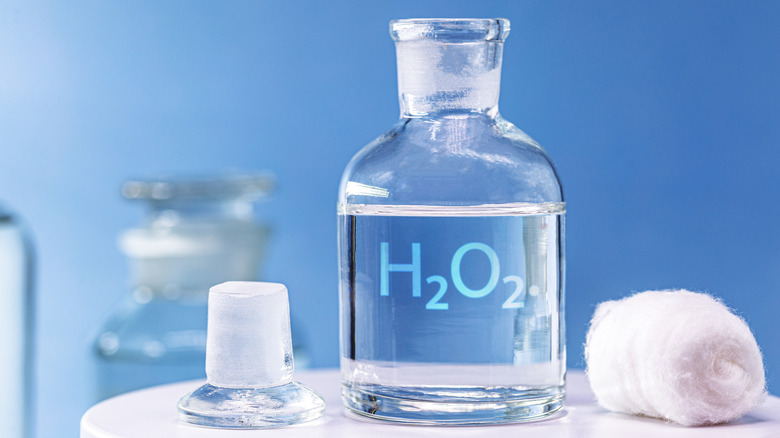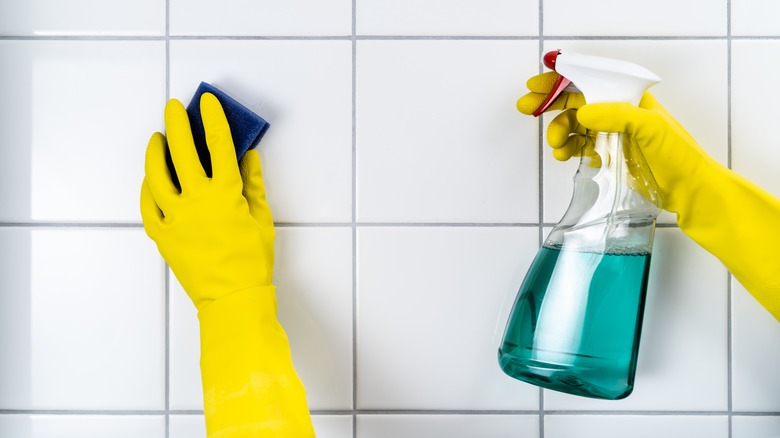Is It Safe To Drink Hydrogen Peroxide? Everything To Consider
It might seem strange to drink the same chemical that your parents used to clean your cuts as a kid. Even so, some people have claimed hydrogen peroxide can cure ailments such as arthritis, AIDS, or cancer. A 2019 article in The Journal of Emergency Medicine described a 48-year-old woman who arrived in the emergency room after using a 3% hydrogen peroxide solution in an enema to treat her constipation. She developed colitis.
Although you'll find a 3% concentration of hydrogen peroxide in the pharmacy, there is a 35% hydrogen peroxide solution that is sold as food-grade. It hasn't been approved by the Food and Drug Administration (via USA Today). People will add a few drops of this food-grade hydrogen peroxide into water for certain health benefits, but Healthline says there is little evidence that drinking hydrogen peroxide can heal you. Besides, it's unclear how much water to add to the hydrogen peroxide, so you might end up drinking more of the chemical than is safe. Accidentally drinking a small amount of 3% hydrogen peroxide solution might make you vomit or give you stomach pain. However, intentionally drinking higher concentrations of hydrogen peroxide can lead to ulcers, burning of the throat, or death.
Hydrogen peroxide is reactive in the body
If you remember your high school chemistry class, water consists of two hydrogen molecules and one oxygen molecule. Hydrogen peroxide has two hydrogen and two oxygen molecules, and it's an unstable chemical. When you ingest hydrogen peroxide, it breaks up into water and oxygen. That might sound good, but the bubbles that form will swell in your stomach in the same way that bubbles form when you pour it into your ear or on a wound. Your stomach might not be able to handle this. You'll wind up vomiting these bubbles, according to the National Capital Poison Center.
If your stomach doesn't get rid of the bubbles, these bubbles could form an embolism in your blood vessels. An embolism could block blood from flowing to places like your brain, which could cause a stroke. Even though some have claimed that drinking hydrogen peroxide can cure cancer, hydrogen peroxide is actually a carcinogen. A 2011 article in Cell Cycle found that hydrogen peroxide can cause DNA damage, inflammation, and accelerated aging.
Use hydrogen peroxide outside the body
Hydrogen peroxide can make your environment more healthy – if you use it correctly, according to Cleveland Clinic. Skip the food-grade hydrogen peroxide and grab a bottle of the 3% hydrogen peroxide. Add one part water to one part hydrogen peroxide to make a bleach alternative to disinfect your home. First clean your surfaces such as bathtubs, countertops, doorknobs, and refrigerators with soap, then spray the hydrogen peroxide solution to kill bacteria, fungi, and viruses. You can leave this solution on the surfaces until dry. However, you should rinse any surface with water that comes in contact with food.
You can clean fruits and vegetables with a quarter cup of hydrogen peroxide in a sink full of water. Just be sure to rinse them before eating. If you have a stain on white (or almost white) clothing, soak the clothing in water and 1 cup of hydrogen peroxide.
Despite common belief, you should avoid using hydrogen peroxide on your skin – particularly on wounds. Hydrogen peroxide can damage the cells that help your wound heal. Hydrogen peroxide is not the same as benzoyl peroxide, so it isn't effective in treating acne.



